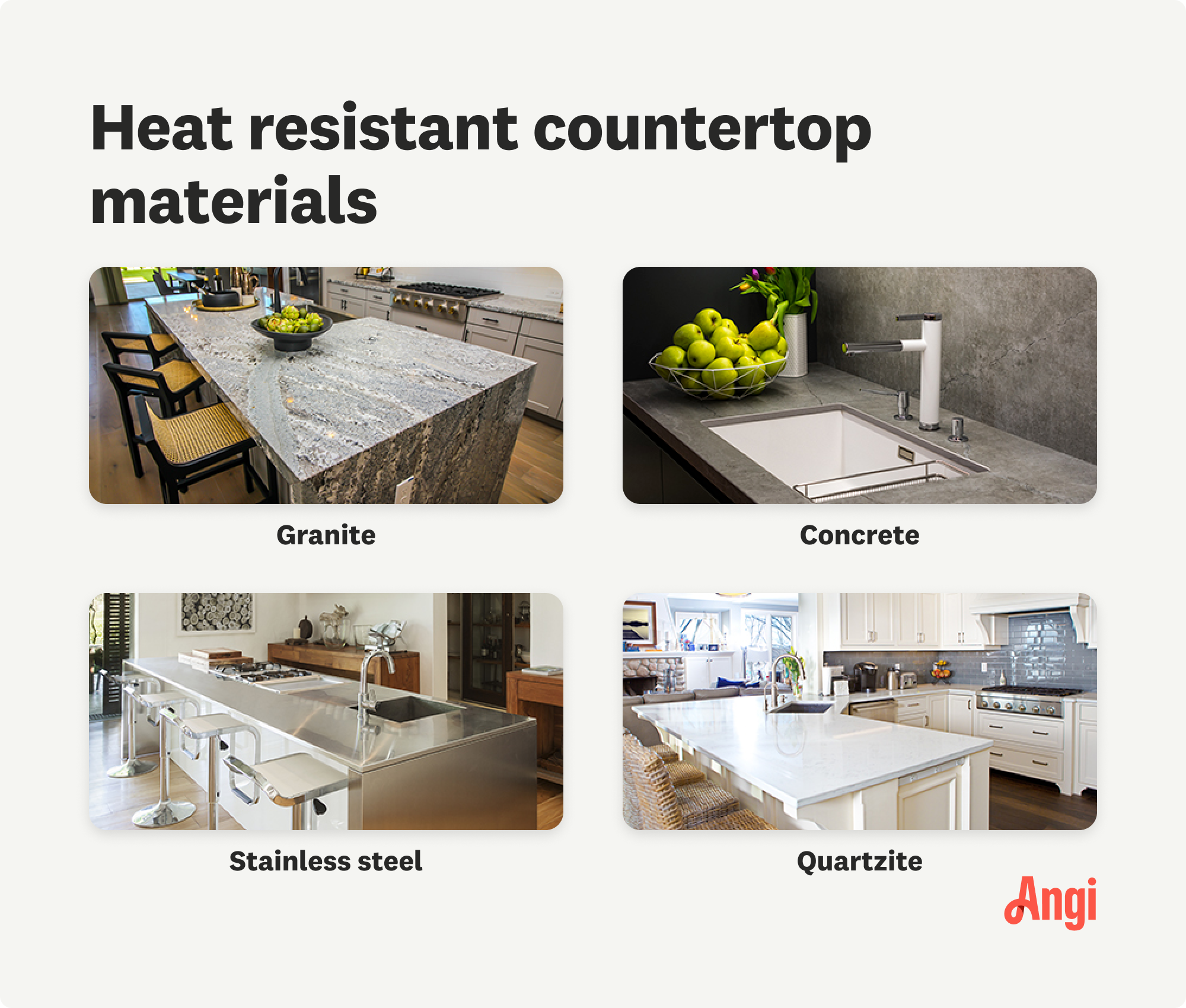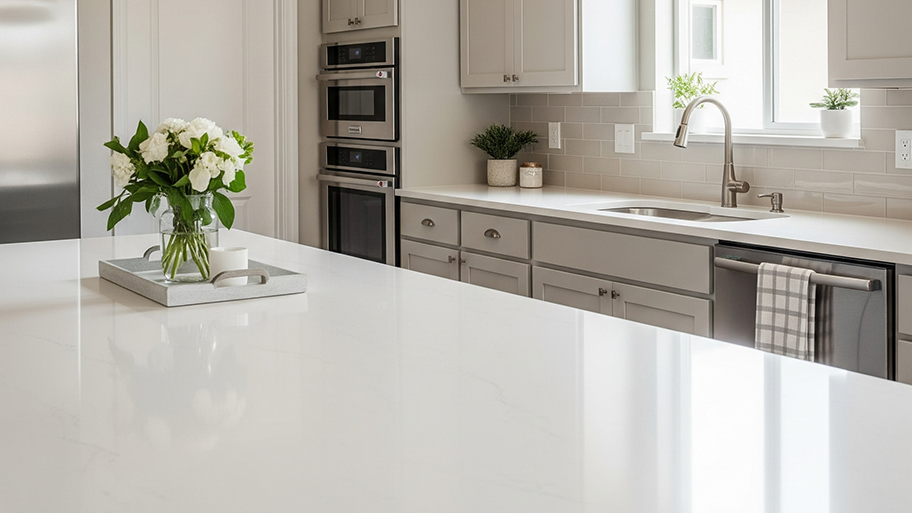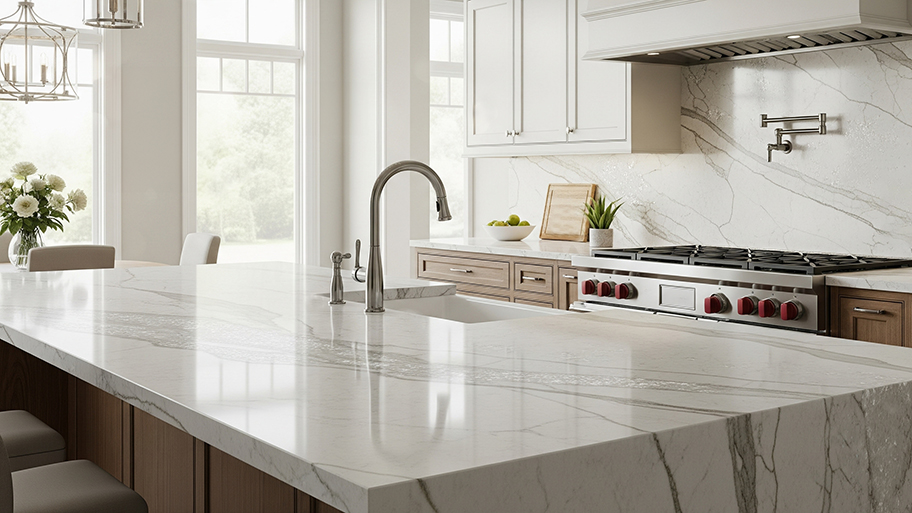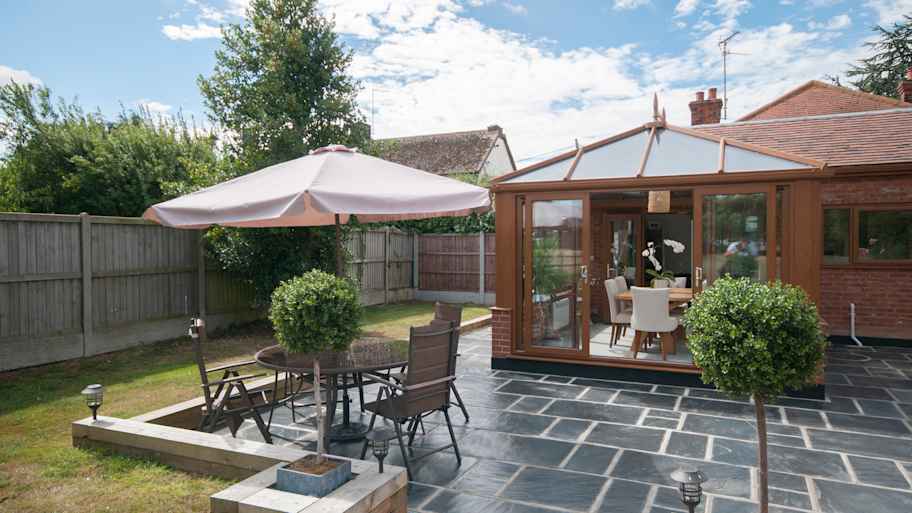
Marble backsplashes are beautiful and costly additions to your kitchen. Our guide lays out marble options and the labor required to install it.
Some like it hot—but for some counters, it’s a hard pass


Quartz is heat-resistant up to about 150ºF.
Quartz consists primarily of natural crystals that stand up to high temperatures, but extreme heat can damage the resin in quartz counters, causing them to crack.
Protect quartz countertops with trivets and hot pads.
Countertop materials that can withstand higher heat include granite, quartzite, and soapstone.
Many homeowners updating their kitchens wonder if quartz countertops are heat-resistant. Before you set down that searing hot cookie sheet, let's look at how quartz surfaces hold up under high temperatures.

Quartz countertops are engineered using around 90% natural quartz crystals combined with resins and polymers. Quartz is highly durable and can tolerate some exposure to heat, but the resin binders are more vulnerable. These materials can degrade from high heat, impacting the overall performance of the surface.
Generally speaking, quartz countertops can withstand temperatures up to about 150°F to 200°F without immediate damage. Anything hotter, like a pizza stone straight out of a 400°F oven, can cause burn marks or discoloration. Remember, while quartz is heat-resistant, it is not heatproof. Other countertop materials like granite and quartzite are more heat-resistant.
Yes, high heat can crack quartz, particularly sudden and extreme temperature changes. For example, taking a scorching cast-iron pan off the stovetop and then placing it directly onto the counter creates the perfect conditions for thermal shock, causing hairline fractures and even deeper cracks.

Fortunately, a few simple steps can help protect your countertop investment.
It is essential to create a buffer between hot cookware and your quartz countertop, whether it's a trivet, hot pad, silicone mat, or even a thick towel in a pinch. Think of these items as insulation for your counter that keeps the resin stable.
We all have a few heat-generating appliances in our kitchens, but items like air fryers, toaster ovens, and crockpots can generate enough heat to damage your quartz counter over time. An easy fix is adding a protective heat mat under these appliances.
Protecting your quartz counters isn't just your job. Ensure everyone in the family and guests know not to place broiling hot items on the countertop.
Heat damage from hot pots and utensils can leave unsightly marks and spots on your kitchen counter. Tile, granite, and stainless steel are more heat-resistant than wood or laminate. Prevent heat damage by letting pots cool on the stove and using trivets.
Most homeowners appreciate natural light and the good vibes it adds to kitchens. But here's the thing: Prolonged exposure to direct sunlight can harm your quartz countertops. While a bit of sun isn't a big deal, daily UV exposure can gradually cause fading and discoloration.
Window coverings are the best bet for protecting white quartz countertops, and you have plenty of options. You can install curtains, blinds, or UV-filtering film to help block or diffuse direct sunlight. Consider this a small prevention that will keep your quartz counters looking great for decades.
Countertops come in all shapes, styles, and price points, but quartz tends to be on the higher end of the spectrum. While the average U.S. homeowner's cost to install a countertop is around $3,140, quartz installations typically clock in at around $4,500. That said, the price tag can swing wildly from $1,000 for a smaller, modest project to $12,000 for high-end quartz in a spacious kitchen.
From average costs to expert advice, get all the answers you need to get your job done.

Marble backsplashes are beautiful and costly additions to your kitchen. Our guide lays out marble options and the labor required to install it.

Silestone® has long been a favorite of homeowners who like the look of quartz. Budget for your Silestone® countertop’s cost with this helpful guide.

How much your quartzite countertops will cost depends on a number of factors—most prominently, the type of quartzite and the size of your counters.

Are you considering adding soapstone counters to your home? Here are the pros and cons of this countertop material to consider before making your decision.

Are you weighing engineered stone vs. natural stone countertops? Both offer many of the same benefits, but there are differences in price, durability, and appearance.

Slate tile offers an upscale, durable flooring option. Our guide explores the pros and cons of slate tile flooring so you can decide if it’s right for you.